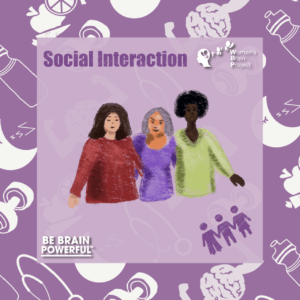Over the past year, our ways of relating to others have been fundamentally challenged. Social distancing and the forced isolation of repeated lockdowns have been accompanied by feelings of fear, mistrust, and anxiety for many. The pandemic has reminded us how much we need to live as a community, to be “social animals”.
From birth, social ties are a key aspect of our development, and they keep on protecting us against physical and mental conditions throughout our lifetime. Personal connections can have just as much of an impact on our lifelong well-being as other more commonly discussed health determinants, such as diet, physical activity, and sleep. Having fulfilling human relationships may decrease mortality by up to 50%, even in those who already have medical issues like Coronary Artery Disease. But why?

Our social environment helps us to cope with difficulties in multiple ways, acting as a mediator between stress and health. Social support works on our body through multiple biopsychosocial pathways.
First, it attenuates the neuroendocrine response to stress – it helps our body release the right chemicals, at the right moment and in the right amount. This is beneficial for our whole physiological functioning, including the cardiovascular system, the immune system, and indeed the nervous system, all of which are highly interconnected. Social support correlates with decreased levels of both cortisol and C reactive protein, an inflammation biomarker. In addition, it can reduce the activation of social distress related brain areas, as well as modulating heart rate, blood pressure and overall cardiovascular reactivity to stress.
The positive psychological effects of sociality are extensive. Actions of care, such as providing or accepting help, have an immediate positive impact on both givers and receivers. In fact, human connections:
- affect our lifestyle by pushing us towards healthier behaviors
- bring feelings of belonging
- help the perception of having a purpose in life
- increase self-esteem
- act as a protective factor against several diseases
- promote better life management, as a consequence of the feeling of being needed by others
- improve mental health overall
Protection against dementia
An active social life can work as a good defense against cognitive decline and dementia, as shown by several studies. Social activity has been found to be linked to global cognition and overall executive functioning, working memory, visuospatial abilities and processing. Conversely, impairment of autonomy and social function may lead to a spiral of negative consequences and decrease overall life satisfaction.
According to data from a Swedish project, social involvement helps reduce the incidence of dementia and preserve cognitive functions, also thanks to mental stimuli. It is therefore recommended for older adults to participate in some kind of collective activity, whether it involves reading, physical exercise, painting classes or similar.
Quality matters as well. The concept of social support reaches far beyond the mere presence of a social network and of social relationships, and may instead be viewed as a first step towards it. It is known that social support comprises several functions with different roles in human health. These include:
- Emotional support, consisting of empathy, love, warmth, caring
- Tangible support, or concrete assistance
- Informational support, guidance or information improving one’s problem-solving strategies
- Companionship support, sense of belonging
The most important distinction is perhaps the one between Received Support (RS), and Perceived Social Support (PSS).Perceived Social Support implies an individual evaluation of the interactions, defining their nature and their helpfulness. The previously mentioned functions contribute to RS and PSS to different extents. RS and PSS do not overlap, and have diverse outcomes on health, with PSS having the most consistent impact on the well-being of the individual, by “buffering” or by direct effect.
Supporting evidence came also from research findings in the “blue zone” of Sardinia. The idea of “blue zones”, areas of the world in which the population seems to live healthier and longer, was brought to into the spotlight by the National Geographic, based on scientific studies. They include Sardinia (Italy), Okinawa (Japan), Loma Linda (California), Icaria (Greece), and Nicoya (Costa Rica).
Results from the examination of the Sardinian population demonstrated how personal ties are key factors in the increased longevity of men and women. There, older people are more actively engaged in their community life as compared to control groups from areas in northern Italy. As it is known, social inclusion has a huge role in perceptions of satisfaction and purpose.
Conversely, social isolation and perceived loneliness are proven to negatively affect physical and mental health. COVID-19 obliged most of us to follow physical distancing, and indeed reduced our opportunities to connect with others. This led to an increase in anxiety and apathy, as well as in stress and depression.
Social distancing, crucial in limiting the virus spread, should not mean social isolation – a complete absence of social relations. Hundreds of digital options have made it possible to somehow keep our social circle. Online communications are of course different from conventional socialization, and not substitutive, and differences in brain activities throughout face-to-face versus digital interactions are currently under investigation. Still, technology can relieve feelings of loneliness and help to limit the damage of prolonged physical separation.
Social interactions are great allies of our brain and our overall health, with the advantage of being completely free, easy to access, and, above all, bringing reciprocity, providing benefits to everyone involved.
Share your time with the people close to you, take care of your relationships. Your brain will thank you.
Don’t forget the 7 pillars of Brain Health:
1. Get daily physical exercise.
2. Reduce risks for mental health-related issues by getting regular checkups with a mental healthcare professional.
3. Ensure you are eating healthy food and getting enough nutrition.
4. Reduce medical health risks by getting regular checkups.
5. Make sure you get good quality sleep.
6. Keep your mind mentally active.
7. Take care of your personal connections and relationships.



